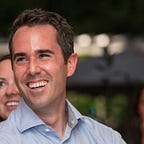In Stormy Seas, Stay the Course
It’s no secret that 2016 has been a tumultuous year. With the UK’s Brexit decision, global interest in November’s U.S. presidential election, on-going Russian aggression in Ukraine, managing migration, and shrinking space for civil society in authoritarian states (and backsliding democracies), many are questioning the future of European security and whether countries — and their leaders — are capable of meeting the challenges of our time.
It’s in this context that Foreign Ministers of the 57 participating States of the Organization for Security and Cooperation gather this week in Hamburg, Germany, for the annual OSCE Ministerial Council. Germany — and Foreign Minister Steinmeier — have invested a great deal in their chairmanship of the OSCE during a difficult and unsettling time.
This year, Russia’s illegal attempted annexation of Crimea and the Kremlin’s manufactured conflict in eastern Ukraine remain at the top of the agenda — as it has for three years. Russian aggression in Ukraine remains the single greatest ongoing violation of the security commitments of the OSCE. And the OSCE’s Special Monitoring Mission is the OSCE’s largest field mission, with more than 700 civilian, unarmed monitors on the ground in the conflict zone reporting daily on the conflict to help inform the actions of world leaders working to end the violence.
Democratic backsliding and shrinking space for independent voices and civil society will also be high on Ministers’ minds. As head of the U.S. delegation, Secretary of State John Kerry will show his support for civil society by meeting with human rights activists and NGO representatives from countries where fundamental freedoms and democracy are under threat.
The OSCE Ministerial also serves as an opportunity for Foreign Ministers to reach consensus on “decisions” — political commitments on certain topics or agreements on how OSCE countries will work together to address certain challenges. For weeks, delegations from Europe, Central Asia, and North America have been negotiating furiously on draft decision texts that range from counterterrorism to cyber, from media freedom to protections for minorities.
Reaching any decision requires consensus — a single participating State can block. Negotiations go down to the wire to find language on which we can all agree. Our approach this year has been one of principled engagement: we want to see decisions that build on four decades of dialogue at the OSCE. Decisions that make our countries and people safer, that move the ball forward on protecting human rights and human dignity. Repressive regimes, on the other hand, seek to exploit what they see as a moment of opportunity to erode, water down, and undermine the 21st Century global security architecture we have worked for decades to build.
Given the challenging environment in which our negotiations are taking place, however, it’s not surprising that reaching consensus will be difficult. In turbulent times, it’s important that negotiators facing the immense pressure of reaching consensus stick to their guns.
“First, do no harm” and “quality over quantity” also apply to our diplomatic approach here. No decision is better than a bad decision, and the success of a Ministerial should not be gauged by the number of texts approved, but rather by the strength of the principles and commitments they contain.
While some may have doubts or insecurities about the change that is on the horizon, it’s also important to remember that the United States and our partners and allies are negotiating from a position of strength. The principles, commitments, and shared values that have undergirded our cooperation since the signing of the Helsinki Final Act provide a rock-solid foundation for our work. The United States and Europe will continue to stand together in the face of global threats. Transatlantic cooperation will remain critical to solving global challenges.
Even if 2016 is not a moment in which we all agree on how to meet the challenges, it certainly is a moment in which continuing to engage — even with those who don’t engage in good faith — is more important than ever. The OSCE remains the only regional security forum where all fifty-seven participating States are at the table and represented equally. And there will come a time when conditions change and the OSCE will become once again a place not only for engagement, but for genuinely cooperative work.
It is in this spirit that the United States is approaching our diplomacy in Hamburg this week — recognizing that we are well-positioned to protect and preserve the progress we have made since the signing of the Helsinki Final Act 41 years ago. Today, in difficult and tumultuous times, the OSCE continues to have value as this inclusive platform, grounded in shared principles, for engagement that isn’t unmoored or transactional. It is an engagement that is intended to be long-term and principles-based. That kind of engagement is as valuable now as it has ever been.
About the author: Daniel B. Baer serves as U.S. Permanent Representative to the Organization for Security and Cooperation in Europe
